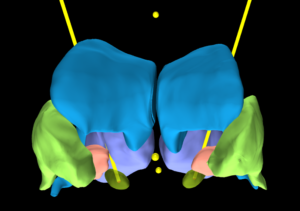Home » Supported Research » Computer-assisted functional neurosurgery
Computer-assisted functional neurosurgery
Title:
Computer-assisted functional neurosurgery
Project Number:
5R01NS095291-12
Contact PI/Project Lead:
Benoit Dawant
Award Organization:
National Institutes of Health
Abstract:
Deep-brain stimulation (DBS) procedures, which are increasingly used to treat a spectrum of movement, mood and behavioral disorders, are complex. Effective electrode implantation requires a painstaking procedure that begins with the challenging task of correlating anatomical target selection with physiological correction to account for patient variance and intraoperative brain shift. Following implantation, stimulation parameters that reduce symptoms while minimizing side effects need to be selected through a test-and-observe process that can be lengthy and spread over several visits. Over the last two funding periods of this project we have developed a system that provides assistance for all phases of the procedure. This system is the first one that permits the capture, storage, and spatial normalization of all data pertaining to DBS cases. This permits the creation of population-derived statistical atlases, customization of this information to individual patients, ad access to this information at the time and point of care. This system has been integrated into the clinical flow at our institution and contains data from more than 1400 subjects acquired at multiple institutions. We have shown that this system has a positive impact on the planning, placement, and programming phases of the procedure and, thanks to commercial partnerships we have established, components of our system are already available for routine clinical use. In this funding period, we will build on our previous efforts to continue the clinical evaluation of or system, expand its functionality, and deploy it at collaborating sites. Our long term goals are to develop and field (1) the first integrated DBS solution that will permit seamless exchange of information between all phases of the procedure and (2) a shared and global resource that will allow rapid dissemination of discovery and outcomes related to specific brain targets. It will thus be a catalyst that can both speed up discoveries in neurological sciences and improve clinical processes.
